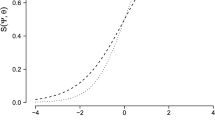Abstract
An item bundle is a small group of multiple choice items that share a common reading passage or graph, or a small group of matching items that share distractors. Item bundles are easily identified by paging through a copy of a test. Bundled items may violate the latent conditional independence assumption of unidimensional item response theory (IRT), but such a violation would not typically suggest the existence of a new fundamental human ability to read one specific reading passage or to interpret one specific graph. It is important, therefore, to have theoretical concepts and empirical checks that distinguish between, on the one hand, anticipated violations of latent conditional independence within item bundles, and, on the other hand, violations that cannot be attributed to idiosyncratic features of test format and instead suggest departures from unidimensionalty. To this end, two theorems on unidimensional IRT are extended to describe observable item response distributions when there is conditional independencebetween but not necessarilywithin item bundles.
Similar content being viewed by others
References
Bock, D., & Lieberman, M. (1970). Fitting a response model forn dichotomously scored items.Psychometrika, 35, 179–197.
Dawid, A. P. (1979). Conditional independence in statistical theory (with discussion).Journal of the Royal Statistical Society, Series B, 41, 1–31.
Esary, J., Proschan, F., & Walkup, D. (1967). Association of random variables, with applications.Annals of Mathematical Statistics, 38, 1466–1474.
Holland, P. (1981). When are item response models consistent with observed data?Psychometrika, 46, 79–92.
Holland, P., & Rosenbaum, P. (1986). Conditional association and unidimensionality in monotone latent variable models.Annals of Statistics, 14, 1523–1543.
Kamae, T., Krengel, U., & O'Brien, G. (1977). Stochastic inequalities on partially ordered spaces.Annals of Probability, 5, 899–912.
Lord, F. (1977). A study of item bias, using item characteristic curve theory. In Y. H. Poortings (Ed.),Basic problems in cross-cultural psychology (pp. 19–29). Amsterdam: Swets and Zeitlinger.
Lord, F. (1980).Applications of item response theory to practical testing problems. Hillsdale, NJ: Erlbaum.
Lord, F., & Novick, M. (1968).Statistical theories of mental test scores. Reading, MA: Addison-Wesley.
Miller, R. (1981).Simultaneous statistical inference. New York: Spring-Verlag.
Rasch, G. (1960).Probabilistic models for some intelligence and attainment tests. Copenhagen: Neilson and Lydiche. (English translation, 1980, University of Chicago Press).
Rosenbaum, P. (1984). Testing the conditional independence and monotonicity assumptions of item response theory.Psychometrika, 49, 425–435.
Rosenbaum, P. (1985). Comparing distributions of item responses for two groups.British Journal of Mathematical and Statistical Psychology, 38, 206–215.
Rosenbaum, P. (1987). Model-based direct adjustment.Journal of the American Statistical Association, 82, 387–394.
Sternberg, R. J. (1977).Information processing and analogical reasoning: The componential analysis of human abilities. Hillsdale, NJ: Erlbaum.
Author information
Authors and Affiliations
Additional information
The author is grateful to Ivo Molenaar and the referees for many helpful suggestions, and to D. Thayer for assistance with computing.
Rights and permissions
About this article
Cite this article
Rosenbaum, P.R. Items bundles. Psychometrika 53, 349–359 (1988). https://doi.org/10.1007/BF02294217
Received:
Revised:
Issue Date:
DOI: https://doi.org/10.1007/BF02294217




